Russia’s contaminated oil crisis continues to drag on four months since it disrupted the country’s crude exports to most of Europe, Reuters reported.
The Russian Druzhba pipeline, which pumps 1 million barrels of oil per day to Western and Eastern Europe, was found in mid-April to be contaminated with organic chlorides. After Russia cleaned up the pipeline and restored supplies a couple of months later, state oil pipeline monopoly Transneft promised to compensate energy companies for contamination-related losses.
But state-run oil giant Rosneft said on Tuesday that Transneft had failed to deliver a solution to the crisis.
Rosneft, whose oil production and profits took a hit from oil intake restrictions imposed by Transneft during the crisis, said in rare comments on Tuesday that the pipeline firm had yet to resolve the problem.
“The future of the tainted oil remains unclear, claims by companies and their business partners are unresolved, and the issue of guaranteeing oil quality during transportation has also yet to be resolved,” Rosneft said in a statement. “The risks to Russia’s image as a reliable supplier … are growing.”
Rosneft, headed by powerful chief executive Igor Sechin, said a number of oil-importing countries, including Poland, and some Mediterranean ports had started to consider other options for importing oil.
“Transneft is mixing oil from different producers on its own. Given that there is no ‘oil quality controller’ in the pipeline system, companies in fact are getting a blend that may not correspond to the oil quality supplied initially,” it said.
According to Rosneft, Transneft gave notification that it planned to supply oil containing organic chlorides of up to 6 parts per million (ppm) to refineries in central Russia and the Baltic Sea port of Primorsk.
Russia allows contamination of up to 6 ppm, but many European refineries cannot process oil with organic chloride content higher than 1 ppm.












